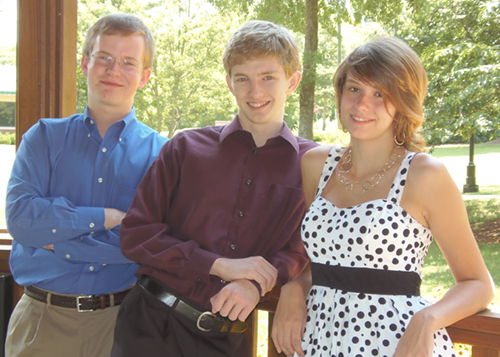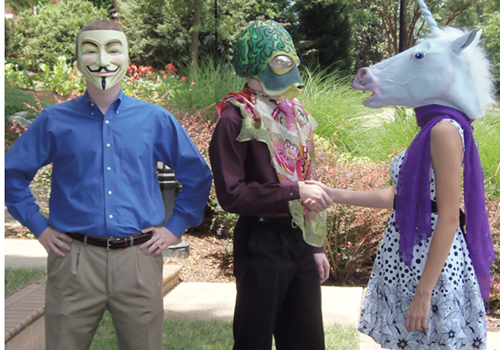Class voted to pray at graduation

From left are Irmo High School students Jacob Zupon, Matthew “Max” Nielson and Dakota McMillan, student plaintiffs in FFRF’s suit challenging graduation prayers in South Carolina.
The Freedom From Religion Foundation filed a federal lawsuit May 30 in U.S. District Court in Columbia, S.C., against School District 5 of Lexington and Richland Counties over a district policy that sanctions graduation prayer. Matthew “Max” Nielson, 18, who graduated May 30 from Irmo High School, was named as principal plaintiff.
Nielson has received a $1,000 Catherine Fahringer Memorial Student Activist Award from FFRF and will speak at FFRF’s 35th annual convention in Portland, Ore., Oct. 12-14. (Read more about the case from Nielson’s perspective on Page 5. You can listen to a June 2 Freethought Radio interview with him at ffrf.org/news/radio/shows/.)
On June 11, FFRF filed an amended complaint adding two new plaintiffs, Jacob Zupon and Dakota McMillan. They will graduate respectively from Irmo High School in 2013 and 2014, keeping the lawsuit ripe. Zupon and McMillan “reasonably anticipate constitutional injury” similar to Nielson’s due to prayer at their upcoming graduations. All students describe themselves as “religiously unaffiliated,” meaning “they subscribe to no particular organized, institutionalized religion, nor other prescribed set of beliefs.”
A district policy titled “School Ceremonies and Observations” sets guidelines for benedictions and invocations at graduations and athletic events: Use of prayer “will be determined by a majority vote of the graduating senior class with the advice and counsel of the principal.”
Nielson was forced during his senior year to participate in a “vote” by graduating seniors on whether to pray at their 2012 graduation. That vote was organized, distributed and tallied by teachers and other staff. He met with Principal Rob Weinkle and Superintendent Steve Hefner to express his concerns. FFRF formally objected, but the district refused to remove the scheduled prayer. FFRF filed suit on the day of the graduation.
The prayer at the graduation, written by the district but delivered by a student “volunteer,” was addressed to “Father.” The prayer asked for the “Lord’s guidance, protection and mercy,” asked students to be “touched” by “the Lord,” to be led “on the path you intend for their lives to lead,” and thanked a deity for “the teachers, parents and administrators that were here through our 12 years of school.”
The students and state-church watchdog FFRF, with over 18,000 members and 130 in South Carolina, allege the district’s written policy violates the First Amendment’s Establishment Clause and the Equal Protection Clause of the 14th Amendment. The U.S. Supreme Court ruled that a similar vote on whether to host prayer at school events violated the Establishment Clause in the case Santa Fe Independent School District v. Doe. The Supreme Court explicitly ruled in the year 2000 case that “a student election does nothing to protect minority views but rather places the students who hold such views at the mercy of the majority . . . . Fundamental rights may not be submitted to vote; they depend on the outcome of no elections.”

Student activists (left) Jacob Zupon, Max Nielson and Dakota McMillan, plaintiffs in FFRF’s suit in South Carolina, make a lighthearted statement about the ramifications of taking an unpopular stand in their high school.
The plaintiffs, represented by South Carolina counsel Aaron Kozloski, ask the court to declare the district’s policy null and void and to enjoin the district from further school-sponsored prayers. FFRF seeks to enjoin the district from further school-sponsored graduation prayers and to award damages, costs and attorney fees. Judge Cameron McGowan Currie will preside over the case.
The legal complaint states:
“The clear purpose of the policy is to promote religion; it hardly lacks a secular legislative purpose; and it cultivates, fosters and fertilizes a most excessive governmental entanglement with religion. The mere passage by the District of this policy evidences a purpose and perception of government establishment of religion. The policy’s text and the circumstances surrounding its enactment reveal that it has such a purpose. The District’s implementation of an electoral process that subjects the issue of prayer to a majoritarian vote has established a governmental mechanism that turns the school into a forum for religious debate and empowers the student body majority to subject students of minority views to constitutionally improper messages. The award of that power alone is constitutionally repugnant.”
“We are really proud of our trio of impressive South Carolina students who are willing to stand up for the Constitution despite community pressure,” said Annie Laurie Gaylor, FFRF co-president.
She noted that students and FFRF should not have to sue over long-settled law. “The U.S. Supreme Court has ruled for more than 50 years that school prayer is inappropriate and specifically found unconstitutional class votes on whether to pray. School graduations should be secular and inclusive,” Gaylor said.